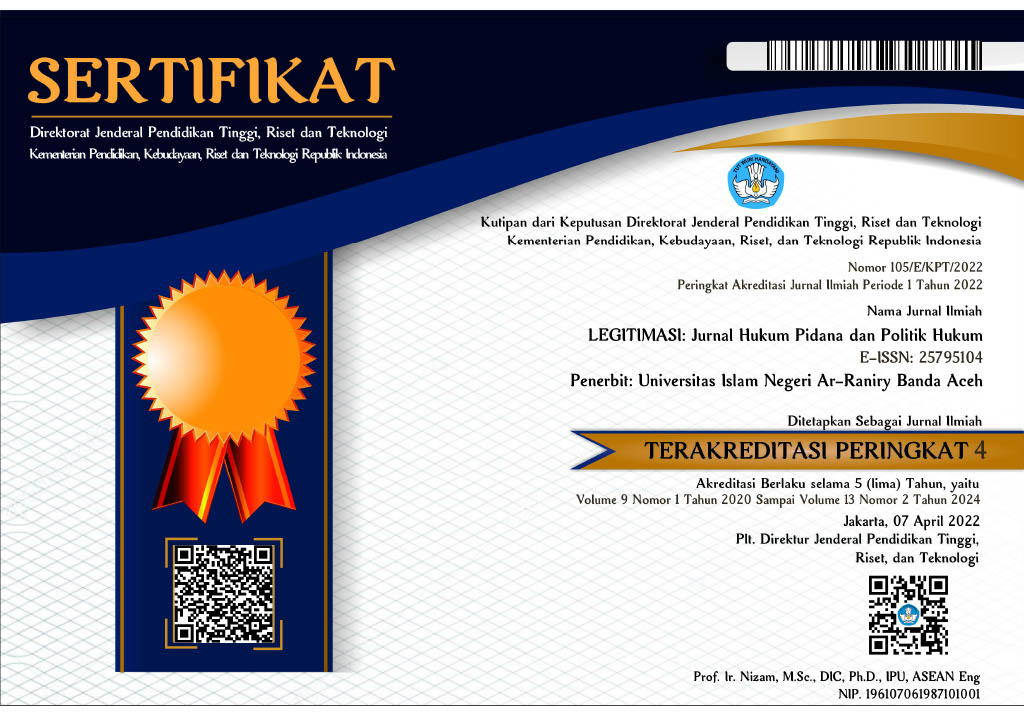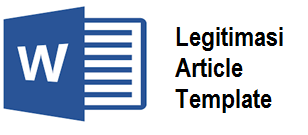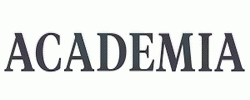Repudiation of Witness of Testimonium De Auditu as Evidence in the Verdict of the Aceh Sharia Court Number 7/JN/2021/MS Aceh [Penolakan Saksi Testimonium De Auditu sebagai Alat Bukti dalam Putusan Mahkamah Syariah Aceh Nomor 7/JN/2021/MS Aceh]
Abstract
Abstract: The acquittal by the Aceh Syar'iyah Court against the defendant in the case of rape in Aceh Besar Regency, was stated in the decision of the appeal case Number 7/JN/2021/MS Aceh which annulled the decision of the judges of the Jantho Syar'iyah Court Number 22/JN/2020/MS- Jth. In this verdict, the panel of judges rejected the witness testimony. The problem is what is the position of the witness testimony in the Criminal Procedure Code and in the decision of the Constitutional Court and what is the consideration of the panel of judges Aceh Syar'iyah Court against the witness testimony submitted by the public prosecutor? This study is normative. The results of this study indicate that the panel of judges considers statements from witnesses who have not seen and experienced criminal events themselves has to be rejected. The presence of testimony witnesses in the Criminal Procedure Code does not have the power of witnesses in general but following the Constitutional Court Decision Number 65/puu-viii/2010 regarding the examination of the Criminal Procedure Code, it has been acknowledged that the strength of the evidence of witness testimony is the same as that of other witnesses. In conclusion, the MS Aceh panel of judges should have accepted the testimony of witnesses.
Abstrak: Vonis bebas oleh hakim Mahkamah Syar'iyah Aceh terhadap terdakwa kasus pemerkosa di Aceh Besar, tertuang dalam putusan perkara banding Nomor 7/JN/2021/MS Aceh yang membatalkan Putusan Majelis Hakim Mahkamah Syar’iyah Jantho Nomor 22/JN/2020/MS-Jth, dalam putusan ini majelis hakim menolak saksi testimoni Permasalahannya adalah bagaimana kedudukan saksi testimoni dalam KUHAP serta dalam putusan Mahkamah Konstitusi dan bagaimana pertimbangan majelis hakim MS Aceh terhadap saksi testimoni yang di ajukan JPU?. Studi ini adalah studi normatif. Hasil studi ini menunjukkan bahwa majelis hakim menganggap keterangan dari saksi yang tidak melihat sendiri dan mengalami sendiri peristiwa pidana maka harus ditolak, kemudian keberadaan saksi testimoni dalam KUHAP tidak mempunyai kekuatan seperti saksi pada umumnya namun dalam Putusan Mahkamah Konstitusi Nomor 65/puu-viii/2010 tentang pengujian KUHAP telah mengakui kekuatan alat bukti saksi testimoni sama dengan keterangan saksi lainnya. Kesimpulannya seharusnya majelis hakim MS Aceh harus menerima keterangan saksi testimoni.
Keywords
Full Text:
PDFReferences
Bahri, S. Hukum Pembuktian Dalam Praktik Peradilan Pidana. Yogyakarta: P3IH FH UMJ Totalmedia, 2009.
Djoko Prakoso. Alat Bukti dan Kekuatan Pembuktian di dalam Proses Pidana. Yogyakarta: Liberty, 1988.
Ghazali, Adami. Hukum Pembuktian Tindak Pidana Korupsi. Bandung: Alumni, 2008.
Hamzah, A. Hukum Acara Pidana Indonesia. Jakarta: Sinar Grafika, 2010.
Hasanah, S. “Arti Testimonium De Auditu”. www.hukumonline.com.
Muhadar. Perlindungan Saksi dan Korban Dalam Sistem Peradilan Pidana. Surabaya: Putra Media Nusantara, 2009.
Nasution, K. Masalah Hukum Pembuktian dalam Proses Pidana. Jakarta: Liberty, 1975.
Petikan Putusan Mahkamah Syariah Aceh Nomor 7/JN/2021/MS Aceh
Sasangka. Hukum Pembuktian dalam Perkara Pidana. Bandung: Mandar Maju, 2003.
Siagian, Amrizal, Sumarsih, Esi. “Kekuatan Saksi Anak Sebagai Alat Bukti Dalam Tindak Pidana Persetubuhan Terhadap Anak.” Mizan: Journal of Islamic Law 4, no. 2 (2020).
Soesilo, R. Kitab Undang-Undang Hukum Acara Pidana. Bogor: Politea, 1996.
Wan Ismail, Wan Abdul Fattah, Baharuddin, Ahmad Syukran, Abdul Mutalib, Lukman, Abdul Rab al-Qubaty, Muneer Ali. “Document Falsification/Forgery from the View of Islamic Jurisprudence and Malaysian Law.” Al-Jami’ah: Journal of Islamic Studies 57, no. 2 (2019): 459–98.
DOI: http://dx.doi.org/10.22373/legitimasi.v10i1.10519
Refbacks
- There are currently no refbacks.
Copyright (c) 2021 Amrullah Bustamam

This work is licensed under a Creative Commons Attribution-NonCommercial-ShareAlike 4.0 International License.
Published by Islamic Criminal Law Department, Faculty of Sharia and Law, Universitas Islam Negeri Ar-Raniry Banda Aceh.

























